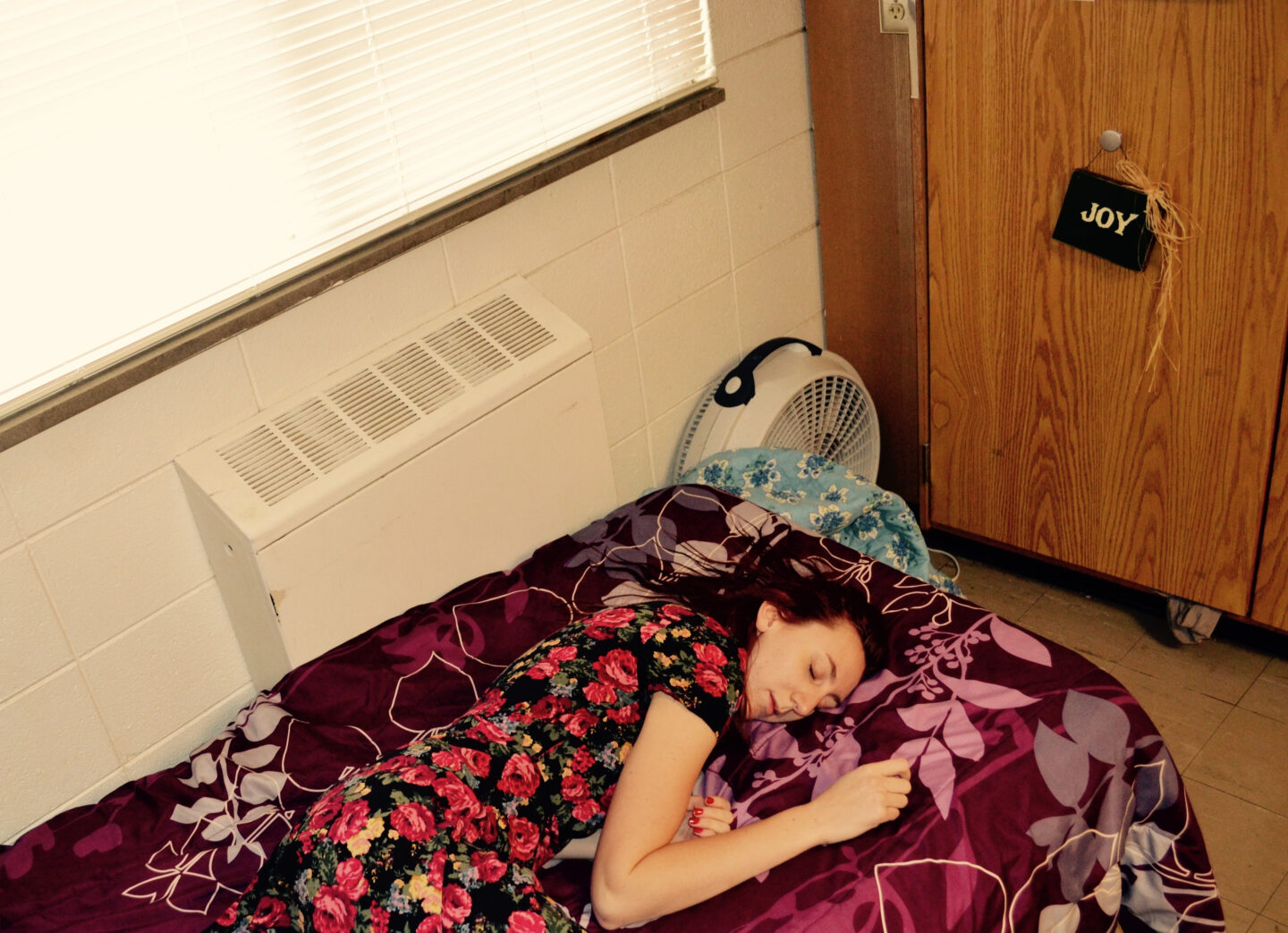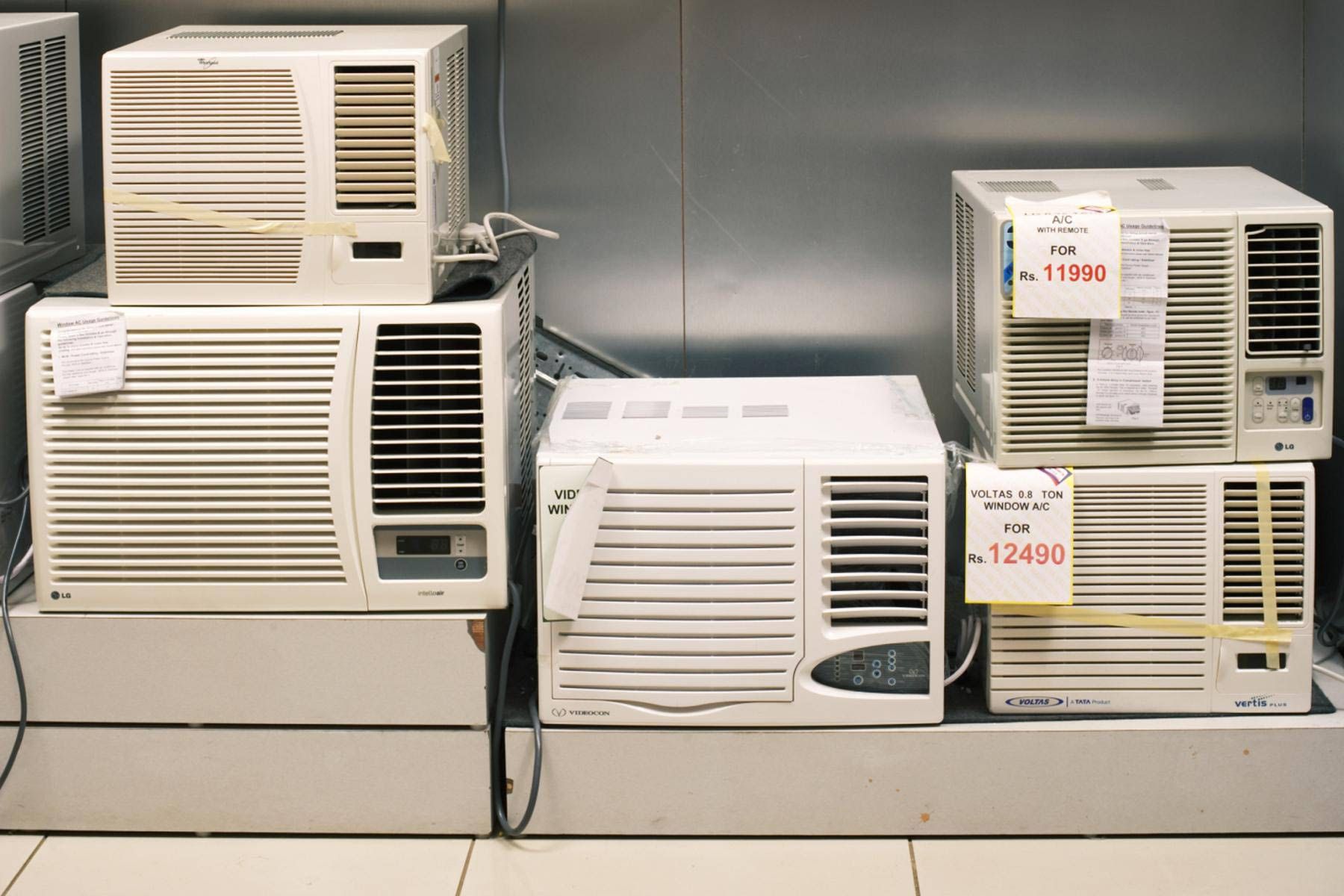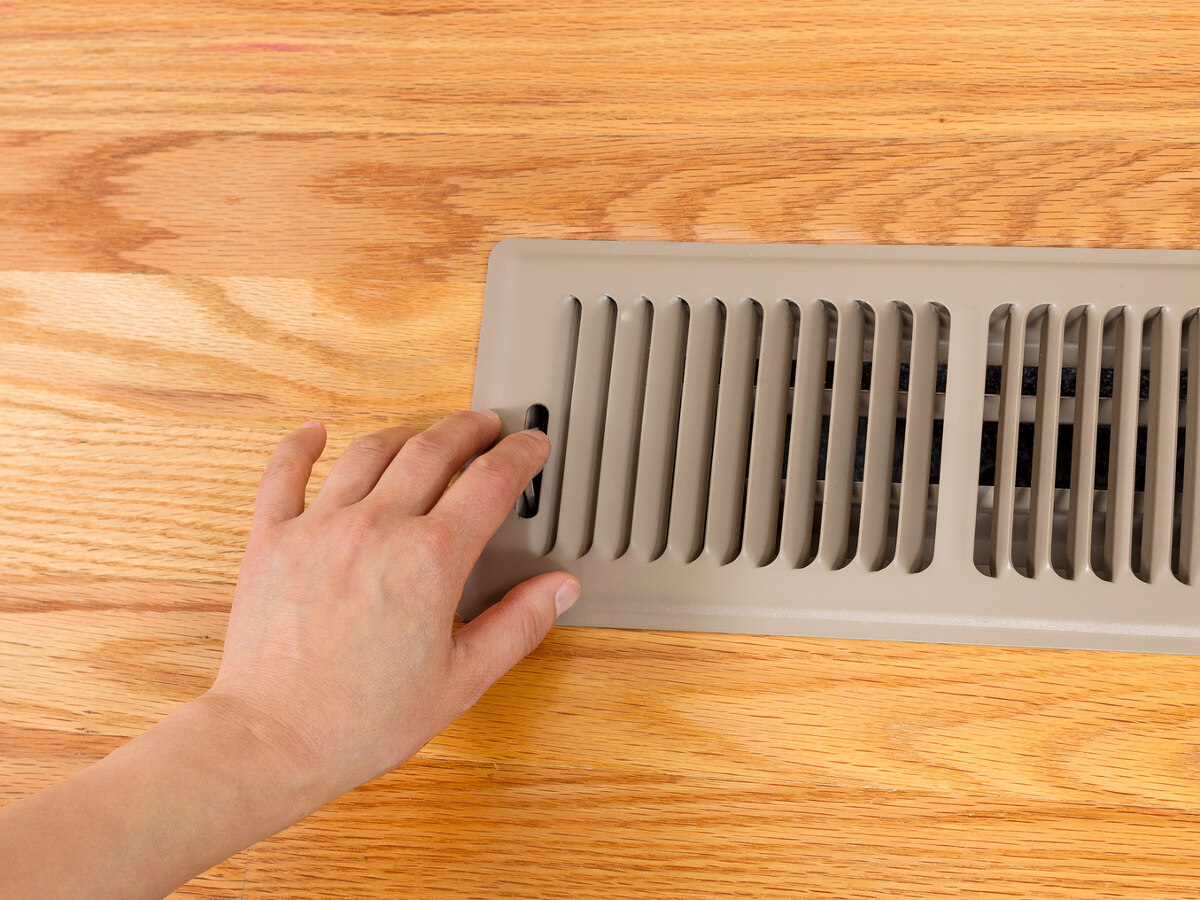Home>Home Maintenance>How To Sleep Without Air Conditioning


Home Maintenance
How To Sleep Without Air Conditioning
Modified: October 20, 2024
Learn how to sleep comfortably at home without air conditioning with these practical home maintenance tips. Keep cool and save energy!
(Many of the links in this article redirect to a specific reviewed product. Your purchase of these products through affiliate links helps to generate commission for Storables.com, at no extra cost. Learn more)
Introduction
Whether you live in a hot climate or experience sweltering summer nights, sleeping without air conditioning can be a challenge. While air conditioning provides instant relief from heat, it may not be an option for everyone due to various reasons, such as energy efficiency concerns, budget constraints, or simply a preference for more eco-friendly alternatives.
However, with the right strategies and adjustments, you can still achieve a comfortable and restful sleep even without air conditioning. In this article, we will explore different ways to keep cool at night and ensure a good night’s sleep, regardless of the temperature outside.
Before diving into the specific techniques, it is important to understand why comfortable sleep is crucial for our overall well-being. Proper sleep is essential for the body to repair and rejuvenate itself, allowing us to wake up refreshed and ready to take on the day. It helps regulate our mood, improves cognitive function, and strengthens the immune system. Lack of sleep or poor quality sleep, on the other hand, can lead to a range of issues, including increased stress levels, decreased productivity, and even health problems.
To ensure a restful sleep without air conditioning, we need to evaluate our bedroom environment, make the right choices when it comes to bedding and mattress, utilize natural cooling techniques, and implement behavioral changes that promote better sleep. Let’s explore each of these aspects in detail to create a sleep-friendly space that helps us beat the heat.
Key Takeaways:
- Stay cool and sleep well without air conditioning by creating a calming bedroom environment with natural ventilation, breathable bedding, and a consistent bedtime routine.
- Beat the heat and improve sleep quality by using cooling pillows, natural ventilation, and relaxation techniques to create a comfortable and restful sleep space.
Understanding the Importance of Comfortable Sleep
When it comes to achieving optimal health and well-being, few things are as essential as getting a good night’s sleep. Sleep is a time for our bodies to repair and recharge, aiding in physical and mental recovery. It plays a vital role in our overall functioning, affecting our mood, cognitive abilities, and immune system.
Research has shown that lack of sleep or poor quality sleep can have a detrimental impact on our daily lives. It can lead to increased stress levels, impaired concentration and memory, decreased productivity, and a weakened immune system. Prolonged sleep deprivation can even increase the risk of developing serious health conditions such as obesity, diabetes, and cardiovascular diseases.
When it comes to sleeping comfortably without air conditioning, maintaining a cool and relaxing environment becomes crucial. Our bodies naturally cool down during sleep, and if the bedroom temperature is too high, it can disrupt the natural sleep cycle and prevent us from experiencing deep and restorative sleep.
Moreover, excessive heat can also lead to discomfort, excessive sweating, and disrupted sleep patterns. This can result in tossing and turning throughout the night, making it difficult to fall asleep and stay asleep, ultimately leading to a restless and unrefreshed state in the morning.
By understanding the importance of comfortable sleep and how it directly impacts our well-being, we can begin to explore various strategies and techniques to create an ideal sleep environment in the absence of air conditioning. In the following sections, we will delve into evaluating our bedroom environment, choosing the right bedding and mattress, utilizing natural cooling techniques, and implementing behavioral changes that promote better sleep. Let’s dive in and discover how we can sleep comfortably, even without air conditioning.
Evaluating Your Bedroom Environment
Creating a sleep-friendly environment is key to ensuring a comfortable and restful night’s sleep, especially when you don’t have air conditioning. Evaluating your bedroom environment and making adjustments accordingly can significantly improve your sleep quality. Here are some factors to consider:
1. Temperature and Airflow:
Start by assessing the temperature of your bedroom. Ideally, the temperature should be between 60-67°F (15-19°C) for optimal sleep. If it’s warmer, you’ll need to implement cooling strategies to maintain a comfortable temperature.
Improve airflow in your bedroom by opening windows, using fans, or utilizing a portable air cooler. Creating a cross breeze by strategically placing fans in open windows can help circulate fresh air throughout the room, making it feel cooler.
2. Lighting:
Ensure your bedroom is adequately darkened to promote better sleep. Use blackout curtains or blinds to block out external light sources, such as streetlights or early morning sunlight. Consider eliminating or covering any digital displays or LED lights that may emit unwanted light during the night.
3. Noise:
Noise can disrupt sleep and prevent you from falling asleep or staying asleep. Identify potential noise sources in your room or surroundings and take steps to minimize their impact. You can use earplugs, white noise machines, or soothing sounds like nature sounds or calming music to create a peaceful sleep environment.
4. Clutter and Organization:
A clutter-free and organized bedroom can contribute to a calm and soothing atmosphere. Remove any unnecessary items from your bedroom that may cause distractions or clutter. Create a serene and tidy space that promotes relaxation.
5. Comfortable Sleep Surface:
Assess the condition of your mattress and pillows. An uncomfortable sleep surface can hinder your sleep quality, especially when trying to sleep without air conditioning. Consider investing in a cooling mattress topper or pillow that helps regulate body temperature and provides optimal support.
By carefully evaluating and optimizing your bedroom environment, you can create a calming and comfortable space conducive to quality sleep, even without air conditioning. In the next section, we will explore the importance of choosing the right bedding and mattress for your sleep needs.
Choosing the Right Bedding and Mattress
When it comes to sleeping comfortably without air conditioning, selecting the right bedding and mattress can make a significant difference. Here are some factors to consider when choosing your bedding and mattress:
1. Breathable Fabrics:
Opt for bedding made from natural, breathable fabrics like cotton or linen. These materials allow for better airflow and ventilation, allowing your body to stay cool during the night. Avoid synthetic fabrics that trap heat and moisture, making you feel hot and sweaty.
2. Moisture-Wicking Bedding:
Look for moisture-wicking bedding materials that help absorb excess sweat and keep you dry throughout the night. Moisture-wicking fabrics such as bamboo or microfiber sheets can help regulate your body temperature and prevent discomfort caused by excessive sweating.
3. Cooling Mattress:
Consider investing in a cooling mattress that is specifically designed to dissipate heat and provide a cooler sleeping surface. Look for mattresses with cooling gel layers or those made with breathable materials like latex or open-cell foam.
4. Adjustable Pillows:
Choose pillows with adjustable loft or firmness levels, allowing you to customize your sleeping position and provide proper neck and spine alignment. Look for pillows that promote airflow, such as those infused with cooling gel or made with breathable materials like shredded memory foam.
5. Mattress Protectors and Toppers:
Using a waterproof and breathable mattress protector can help regulate temperature and prevent moisture build-up. Additionally, consider adding a cooling mattress topper to provide extra comfort and enhance the cooling effect of your mattress.
By selecting bedding and a mattress that promote breathability and moisture-wicking properties, you can create a cooler and more comfortable sleep environment. In the next section, we will explore natural cooling techniques that can help you beat the heat and sleep better without air conditioning.
Utilizing Natural Cooling Techniques
When air conditioning is not available, it’s important to explore natural cooling techniques to help lower the temperature in your bedroom and ensure a comfortable sleep. Here are some effective strategies to consider:
1. Open Windows at Night:
Take advantage of cooler evening temperatures by opening windows and creating a cross draft in your bedroom. This will allow fresh air to circulate and cool down the room naturally. Place fans strategically to enhance airflow.
2. Use Breathable Bedding:
Opt for lightweight and breathable bedding materials, such as cotton or bamboo sheets, which help promote airflow and prevent overheating during the night. Choose a lightweight blanket or a sheet instead of heavy comforters or duvets.
3. Cooling Pillows:
Invest in cooling pillows that are specifically designed to regulate temperature and keep your head and neck cool as you sleep. These pillows often contain cooling gel or are made with breathable materials to prevent heat buildup.
4. Cold Compresses and Ice Packs:
Place a cold compress or ice pack on your wrists, neck, or forehead before bed. These cool spots on your body help lower your overall body temperature, making it easier to fall asleep and stay cool throughout the night.
5. Use Natural Ventilation Techniques:
Create airflow in your bedroom by positioning fans strategically. Place a bowl of ice in front of a fan to blow cool air into the room. You can also hang a damp sheet in front of an open window to cool the incoming breeze.
6. Limit Heat Sources:
During hot nights, minimize the use of heat-generating appliances, such as lights or electronics, in your bedroom. These appliances can increase the temperature in the room, making it more difficult to sleep comfortably.
By applying these natural cooling techniques, you can create a cooler and more comfortable bedroom environment, ensuring a restful sleep without relying on air conditioning. In the next section, we will discuss behavioral changes that can further improve your sleep quality.
Implementing Behavioral Changes for Better Sleep
When it comes to achieving a good night’s sleep without air conditioning, implementing behavioral changes can play a significant role in improving your sleep quality. Here are some changes you can make to promote better sleep:
1. Establish a Consistent Bedtime Routine:
Create a relaxing routine before bed that signals to your body that it’s time to wind down. This can include activities such as reading a book, practicing gentle stretching or yoga, or taking a warm bath. A consistent bedtime routine helps train your body to recognize when it’s time to sleep.
2. Manage Your Exposure to Light:
Avoid exposure to bright lights and electronic screens close to bedtime, as they can interfere with the body’s natural sleep-wake cycle. Dim the lights in your bedroom and consider using blackout curtains or an eye mask to create a dark environment that promotes melatonin production, which aids in sleep.
3. Optimize Your Sleep Position:
Experiment with different sleep positions to find the one that keeps you coolest. Sleeping on your back or side can help promote better airflow and reduce the potential for overheating. Consider utilizing pillows for additional comfort and support.
4. Engage in Relaxation Techniques:
Practice relaxation techniques, such as deep breathing exercises, meditation, or progressive muscle relaxation, to help calm your mind and prepare your body for sleep. These techniques can help reduce stress and promote a more peaceful sleep.
5. Stay Hydrated:
Drink plenty of water throughout the day to stay hydrated. Proper hydration can help regulate body temperature and prevent dehydration, which can disrupt sleep. However, avoid excessive fluid intake close to bedtime to minimize the need for bathroom trips during the night.
6. Choose Breathable Sleepwear:
Opt for loose-fitting and breathable sleepwear made from natural fibers such as cotton or linen. These materials allow for better airflow and help prevent overheating during the night.
By implementing these behavioral changes, you can create a sleep-friendly routine and optimize your sleep environment, allowing for a more restful sleep experience, even without air conditioning. In the next section, we will wrap up our discussion and summarize the key takeaways.
Creating a Sleep-friendly Routine
A sleep-friendly routine is essential for ensuring quality sleep, especially when you don’t have air conditioning. By following a consistent routine, you can signal to your body that it’s time to wind down and prepare for a restful night’s sleep. Here are some key steps to create a sleep-friendly routine:
Read more: How To Air Condition A Shed
1. Set a Consistent Bedtime:
Establish a fixed bedtime and wake-up time that you adhere to every day, even on weekends. This helps regulate your body’s internal clock and promotes a more consistent sleep-wake cycle. Consistency is key for better overall sleep quality.
2. Create a Pre-sleep Ritual:
Develop a relaxing routine before bed that helps you unwind and prepare for sleep. This can include activities such as reading a book, listening to calming music, or practicing relaxation techniques like deep breathing exercises or gentle stretching. Engaging in these activities signals to your body that it’s time to relax and transition into sleep mode.
3. Maintain a Cool Bedroom Environment:
Prioritize creating a cool and comfortable bedroom environment to promote better sleep. Use fans, open windows for ventilation, and opt for breathable bedding materials. Keep the room dimly lit and free from noise and distractions that may disrupt your sleep.
4. Avoid Stimulating Activities Before Bed:
Avoid stimulating activities, such as exercising vigorously or consuming caffeine, nicotine, or alcohol close to bedtime. These can interfere with your ability to fall asleep and stay asleep. Instead, choose calming activities that promote relaxation.
Read more: What Is Air Conditioning
5. Limit Screen Time:
Avoid using electronic devices, such as smartphones, tablets, or laptops, in the hour leading up to bedtime. The blue light emitted by these screens can suppress melatonin production and disrupt your sleep-wake cycle. Instead, opt for reading a physical book or listening to soothing music.
6. Manage Stress Levels:
Take steps to manage your stress levels before bed. Engage in activities that help you unwind, such as practicing mindfulness meditation or journaling to unload your thoughts and worries. Creating a peaceful and calm mental state before sleep can greatly improve your sleep quality.
By creating a sleep-friendly routine and implementing these strategies, you can enhance your sleep quality and promote a restful night’s sleep, even without air conditioning. Consistency and creating a calming environment are key elements to achieving a refreshing and rejuvenating sleep experience.
Conclusion
Sleeping comfortably without air conditioning is indeed possible with the right strategies and adjustments. By evaluating your bedroom environment, choosing the right bedding and mattress, utilizing natural cooling techniques, and implementing behavioral changes, you can create a sleep-friendly space that promotes restful and rejuvenating sleep.
Understanding the importance of comfortable sleep and its impact on our overall well-being is the first step towards achieving quality rest. By creating a cool and relaxing bedroom environment, you can help regulate your body temperature and minimize discomfort during the night.
Choosing breathable fabrics for your bedding, investing in cooling pillows and mattresses, and using natural ventilation techniques can all contribute to a cooler and more comfortable sleeping experience. Additionally, implementing behavioral changes such as establishing a consistent bedtime routine, managing exposure to light and noise, and engaging in relaxation techniques can further improve your sleep quality.
Remember to stay hydrated, avoid stimulating activities before bed, and limit screen time to create a calm and peaceful atmosphere that promotes sound sleep. By incorporating these strategies into your routine, you can ensure a restful night’s sleep and wake up refreshed and ready to take on the day.
While air conditioning may not be available or desirable for everyone, with these tips and techniques, you can still enjoy a comfortable night’s sleep and beat the heat without relying solely on artificial cooling methods. Rest well and enjoy the benefits of a good night’s sleep.
Frequently Asked Questions about How To Sleep Without Air Conditioning
Was this page helpful?
At Storables.com, we guarantee accurate and reliable information. Our content, validated by Expert Board Contributors, is crafted following stringent Editorial Policies. We're committed to providing you with well-researched, expert-backed insights for all your informational needs.







